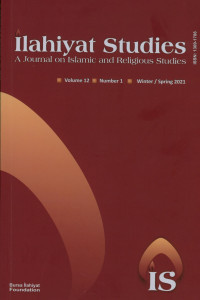Fī Uṣūl al-Ḥiwār wa Tajdīd ʿIlm al-Kalām by Ṭāhā ʿAbd al-Raḥmān by Ṭāhā ʿAbd al-Raḥmān
Fī Uṣūl al-Ḥiwār wa Tajdīd ʿIlm al-Kalām by Ṭāhā ʿAbd al-Raḥmān by Ṭāhā ʿAbd al-Raḥmān
- ISSN: 1309-1786
- Başlangıç: 2010
- Yayıncı: Bursa İlahiyat Vakfı
Fī Uṣūl al-Ḥiwār wa Tajdīd ʿIlm al-Kalām by Ṭāhā ʿAbd al-Raḥmān by Ṭāhā ʿAbd al-Raḥmān
Ṣābī Matter: The Issue of Whether the Concept Ṣābī in the Qurʾān Signifies Ṣābiʾī/Ṣābiʾa
The Reception of Ibn Sīnā's Physics in Later Islamic Thought
Postmodernization of Religion: A Brief Remark
International Symposium on Molla Fanārī
Metinlerle Günümüz Tasavvuf Hareketleri [Contemporary Sufi Movements Through Texts], by Mustafa Kara
Memories of Muhammad: Why the Prophet Matters, by Omid Safi
The Qurʾān: Text, History and Culture, 6th Biennial Conference on the Qurʾān
